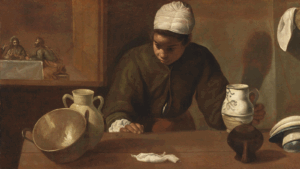“In the beginning was the Word, and the Word was with God, and the Word was God… And the Word became flesh and lived among us.” — John 1:1, 14
The first time I hosted a Help Exchange overnight guest, I was a bit nervous and my spouse AaronMoses' brother and spokesman, and Israel's first high priest. More was even more apprehensive. We had no idea that it would bloom into a ministry concept that we now call Host + Found.
One of the most memorable experiences I had was the day I moved the dining room table into the living room to make enough space for the six Taiwanese guests that, in some ways accidently, ended up in our home. I had approved three young men to come and stay for two weeks, and Aaron simultaneously approved three young women. So, to our surprise, that day two sets of three sojourning guests entered our living room.
Aaron brought up the folding chairs and paper napkins, nothing fancy. We prepared a meal, a simple story from Scripture, and an invitation for people to respond with stories of their own. When the doorbell rang and the first guest walked in, still holding grief from a lost job, and apprehension about their language skills, I realized I wasn’t there to teach. Having lost my career at the time as well, and really not knowing the words to express myself either, we were on the same path.
In many ways we walked together down the road to Emmaus (LukeThe "beloved physician" and companion of Paul. More 24:13-35). The vulnerability and shared space of grief and general curiosity about each other placed us in step with the biblical story and allowed us to walk together with JesusJesus is the Messiah whose life, death, and resurrection are God's saving act for humanity. More, while not quite knowing the full significance of the exchange. By the end of the 17-day cultural and theological immersion and exchange, as laughter and tears spilled together, I would venture to say we all saw clearly: the Word had become flesh again. Not in doctrine, but in dinner and dancing. Not in perfection, but in presence. Jesus showed up in the breaking of bread and the breaking open of hearts.
Theology that shows up
Incarnational theology, acting like God dwells among us, isn’t about rehearsing the right words. It’s about being the Word, embodied—living in proximity to others, offering presence before explanation.
When people gather for a Host + Found home share or even using a Help Exchange model, it’s not a lecture. It’s not even a Bible study in the formal sense. It’s a table, a guest room and the invitational opening of our secret thoughts where gospel stories become prompts for real stories—unpolished, unfinished, and holyHoly is a term that originally meant set apart for the worship or service of God. While the term may refer to people, objects, time, or places, holiness in Judaism and Christianity primarily denotes the realm of the divine More.
Aaron once shared how the story of ZacchaeusA wealthy chief tax collector in Jericho who came to believe in Jesus. More helped him step into an incarnational space where he could live into a more vulnerable and open life as a character in a Bible story: the sycamore tree. Aaron was able to observe Jesus as he invites himself over to Zaccheus’ home, from the 15 foot perspective of the tree that partially made their connection possible. There’s no predictability, or even firm time limit on the encounter that happens from there. I love how Aaron can identify as a tree, a sunflower over Camp Widewater, and even a donkey, but I’ll save that story for another time! Placing yourself in the story is the key takeaway here.
Jesus didn’t wait for people to climb toward heaven. He met them under trees. On the road. At home.The Word still does that. We can too, when we leave enough room at the table, enough time to build a relationship, doors unlocked, indicating safe harbor, and the protectors of our self consciousness adequately at bay.
In many ways, Host + Found, as a work in progress, is my small contribution to not only a hope-filled incarnational theology, but also to a reparative theology. I mean this not in the political sense alone (though we need that too), but in the personal: repairing what’s broken by loneliness, by exclusion, or by silence.
Our continued connection, even after a guest leaves our home, becomes digital ministry, and like embodied gathering, this too is a part of the reparative process. If our theology is going to be hopeful—and hope-filled—it must be brave enough to become flesh in the presence of real people, in a myriad of ways. It must dwell among us and we must have a pathway for continuing the conversation.
The Word lives here
Lately, I’ve been holding a unique mantra in my heart: “Bye for now.”
That’s the heart of incarnational hope, that we intentionally leave each other room to hope, by knowing that we are in connection for an indeterminate length of time.






